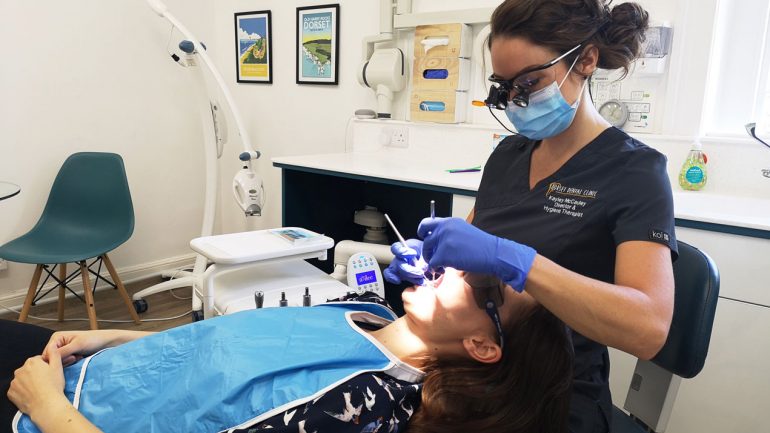Dorset Dental Clinic answer all your questions about why it is important to visit the dental hygienists and therapists.
What are dental hygienists and dental therapists?
Dental hygienists and dental therapists are specially trained to work with the dentist to give care to patients and can help with your treatment plan. Many are qualified as both hygienist and therapist.
They play an important part in your dental health care.
What is the dental hygienist’s role in the practice?
Dental hygienists are mainly concerned with ‘preventive’ dental health and treating gum disease – showing you correct home care and helping you to keep your teeth and gums healthy. This includes professionally cleaning your teeth by removing plaque and tartar (usually called a ‘scale and polish’) However, perhaps their most important role is showing you the best way to keep your teeth free of plaque. Plaque is a sticky coating that forms constantly on your teeth. Hygienists also give advice about diet and preventing tooth decay.
What is the dental therapist’s role in the practice?
As well as doing all the work that a dental hygienist does, a dental therapist can also carry out some dental procedures that patients are more used to a dentist doing. A dental therapist can do fillings, extract ‘baby’ teeth, place preformed crowns on baby teeth and do treatments using all the materials a dentist would use. As long as an adult tooth does not need treatment to the nerve of the tooth, a dental therapist can fill or restore any part of the tooth that needs treatment. They do not do restorations, such as crowns, to adult teeth.
Can a dental hygienist do anything else?
Dental hygiene therapists also take dental x-rays, place fissure sealants, apply fluoride varnishes and administer fluoride treatments. Tooth whitening is also often carried out by the dental hygiene therapist, under a prescription from your dentist.
Does every practice have a hygienist or hygiene therapist?
Not all practices do, but more of them now offer this as part of their service to patients. They can see patients under the prescription of a dentist, see them as part of a separate treatment plan or can see them independently as part of their own practice.
Left: Before hygiene
Right: After hygiene, 30 minutes later
Why is this dental treatment important?
Regular professional cleaning to remove plaque and tartar, combined with looking after your teeth and gums properly at home, will help keep your mouth healthy. A clean and healthy mouth will improve your appearance, help you to keep your teeth and give you fresh breath.
Can a hygienist help prevent dental disease?
This is what the training of the hygienist is all about. They will carefully remove the hard deposits of calculus that build up on the teeth and teach you how to prevent them coming back. This will do a lot to slow the progress of gum disease.
By talking to you about your diet, and recommending other preventive measures, the hygienist can help you keep to a routine that will slow down tooth decay. Regular visits and advice will help build your confidence in keeping your mouth healthy.
What other help can be given to adults?
Adults who have a lot of decay can benefit from having fluoride applied. They can also have anti-bacterial gels and solutions applied under the gum to kill the bacteria.
Another very important part of the hygienist’s work is showing you and telling you how to look after your mouth at home. The hygienist may also suggest giving up smoking, as this will reduce staining and improve your general health.
Research has also shown that smokers have more gum disease and lose more teeth than non-smokers. Your hygienist will be able to advise you on various ways of giving up smoking. They can also give you special advice for home care if you have dental implants or orthodontic appliances.
Why doesn’t the dentist do this work?
Some dentists will do this type of work themselves. However, many now realise that the hygienist has been specially trained to carry out scaling and polishing and can spend longer with you. They are also expert at teaching you how to look after your teeth and gums. Often the hygienist/therapist will spend several appointments getting the gums healthy ready for the dentist to restore the teeth with crowns.
Will the treatment hurt?
Scaling and polishing is usually pain free. However, if you do have any discomfort, they can use anaesthetic creams, or give you some local anaesthetic. It is important that you let the hygienist/therapist know at the time so they can help with your pain.
Is the treatment expensive?
Costs of treatment will vary depending on what is being done, and from practice to practice. It is important to find out the cost before you start, by getting a written quotation.
What should I do after I see the hygiene therapist?
You can do a lot to help yourself and the hygienist/therapist, as you are the one who looks after your mouth in between visits to the practice. They will have shown you how to remove plaque with a toothbrush and fluoride toothpaste.
They will also have shown you how to clean between your teeth with ‘interdental’ brushes, floss or tape. There are many oral care products you can get, including specialist toothpastes, electric or ‘power’ toothbrushes, and mouthwashes. They will recommend those that are best for you.
- We recommend that you follow three simple steps to help keep your teeth and gums healthy:
- Brush your teeth last thing at night and at least one other time during the day, with a fluoride toothpaste.
- Cut down on how often you have sugary foods and drinks.
Visit your dental team regularly, as often as they recommend.
Contact
t. 01202 973300
w. www.dorsetdentalclinics.com
a. Dorset Dental Clinic, 3 Longfleet Road, Poole, BH15 2HN



Leave a Reply